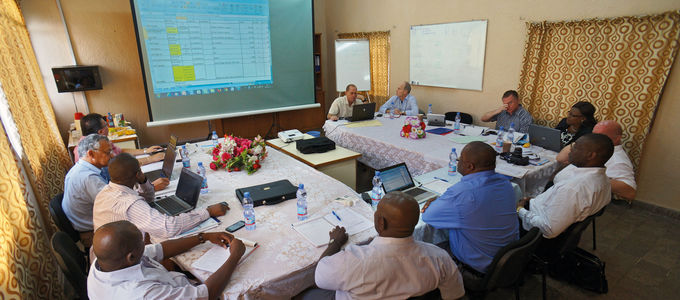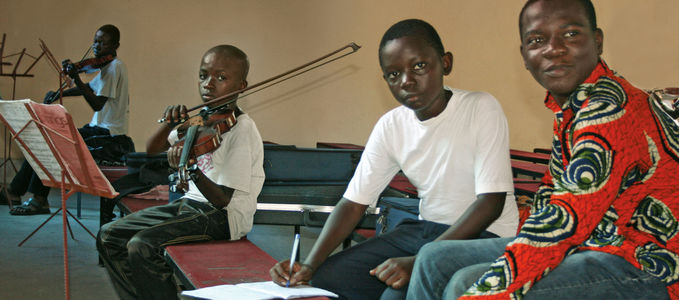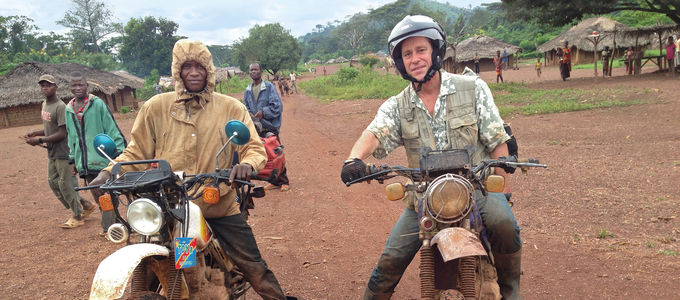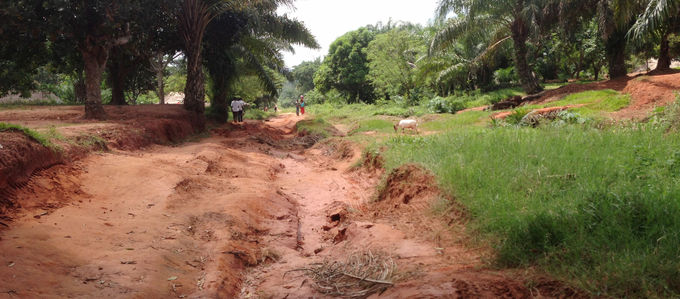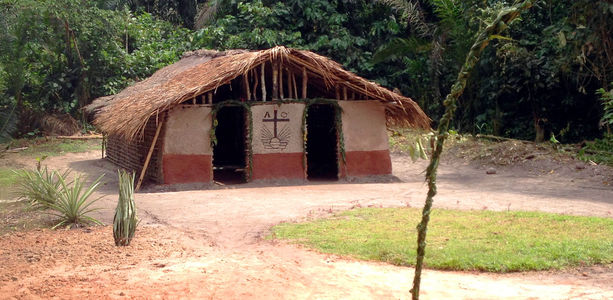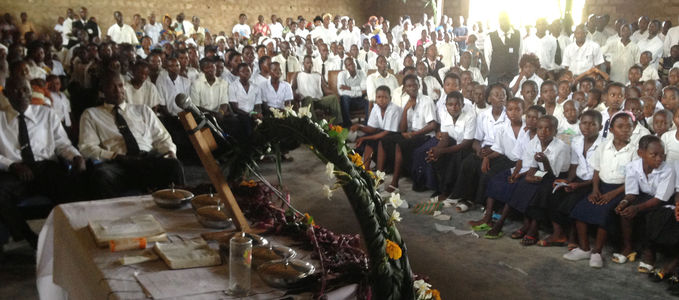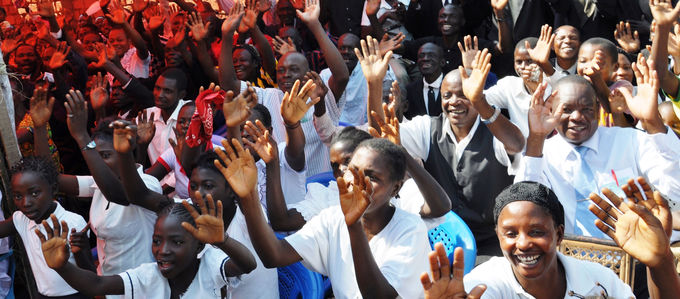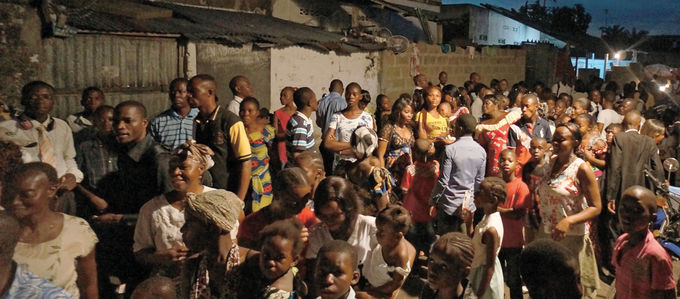
“Honey, hello, you’re here!” My wife waves her hand in front of my face. “Here in Germany.” Oh, right, I am here, at least physically. But my heart is still in the Congo. I have just returned from a flying visit to the Democratic Republic of the Congo. The country has cast a spell over me.
It is January 2014. We are picked up at the airport in a four-wheel drive—the best vehicle for these kinds of conditions. There are no lanes so people drive all over. In between all these moving heaps of metal, dented minibuses whizz in and out. Their sliding doors are open. Pedestrians jump on, grab the railing on the roof with one hand, and fling in the other arm to give the driver his fare. Whenever a gap opens up, people run across the road. Our driver is highly concentrated. This bumper-to-bumper madness continues for kilometres. And all these people!
Three New Apostolic Congos
We arrive at the Church offices in Kinshasa. The building is surrounded by a metal fence: witness of an eventful past and protection from political unrest. The New Apostolic Church has been active in the Democratic Republic of the Congo (formerly Zaire) since the mid 1970s. In the year 1978 the Church was officially recognized by the state.
Today three Church districts are active in the region. For one, there is the Republic of the Congo, which is cared for by the New Apostolic Church Canada. Then there is its big neighbour, the Democratic Republic of the Congo, which is divided into two separate District Apostle areas: the south-eastern part under District Apostle Tshitshi Tshisekedi and the western part under District Apostle Michael Deppner.
A session of the Work Group Africa
The Work Group Africa is meeting at the Church offices in Kinshasa. The agenda, if printed on paper, would be a big pile, but everybody is working on notebooks and with a digital projector. Only the power is a little jerky. When the public power grid fails—which happens fairly regularly—the Church’s generator kicks in. Sentence by sentence the group goes through the Catechism in Questions and Answers—and hits a snag. The topic is marriage.
The prerequisite for receiving a blessing in the Church is the civil ceremony. In parts of Africa, however, this is tied to a traditional marriage and the bride price, which is considered a necessary step prior to a legal wedding. Often the man will be required to pay a bride price to his future wife’s family. The amounts are sizable and have exploded with time. Either the couple raises the money by running up high debts or they live together without getting married. “What can they do?” a member of the committee asks. “I mean, they want to get married!”
A wealth of people, a lack of money
Back at the hotel I watch the bustling activity in the city from my window. An old woman is sitting on a crate in front of a stand that has been crudely cobbled together, peddling her wares. I don’t see any customers. A boy, maybe 14 or 15 years old, is carrying a huge and very heavy looking plastic tarp on his head filled with bottled water. In one hand he has two sticks that he keeps tapping together while he serves his customers with the other hand.
These are some of the countless scenes that make the daily struggle for survival so oppressive. And there are so many people! “The employment rate here is as high as your unemployment rate in Germany,” District Apostle Deppner told me.
The Democratic Republic of the Congo is one of the poorest countries in the world. According to the World Bank, the per capita income lies at two dollars per day, adjusted to relative purchasing power. This is just one twentieth of the global average. And yet the country is immensely wealthy in terms of natural resources. But civil wars have shattered the economy.
Nearly one third of all Church members
Divine service in Kinshasa. Alone the city is divided into eight Apostle districts. Hundreds of members are waiting in the church, all in their black and white. The same number is crowding around loudspeakers outside the church. The Congo is the region with the biggest membership. The three District Churches that are active there count nearly three million members. This accounts for nearly a third of the membership of the New Apostolic Church worldwide.
District Apostle Deppner is moved as he steps into the church. A tapestry adorns the wall behind the altar. This is the first time. It was crafted by young people and paid for with their own money. District Apostle Tshisekedi is called to assist in the service and says, “I’m disappointed. I don’t see any joyful faces.” Okay, that’s a pretty clear message. “I know why,” he continues. “You have big worries and are hoping that the circumstances will improve. But that is not why we are here. The focus here is on the soul.” The faces lighten up and everyone beams.
The sound of joy in Christ
After the divine service, the choir sings a song. And another one. And another one. After the fourth song, District Apostle Deppner decides to leave and says goodbye. “If we hadn’t left, the choir would have continued for another two hours,” he says on the way out. None of the songs are found in a book. They have been written and composed locally, and talk about the gospel of Jesus.
In an unfinished building tables have been set up and a buffet-style meal prepared. There is background music from a CD player, pop music. It was composed and written by young people who have no jobs, but who funded the project themselves. This too is a way to express joy in Christ.
It is time to leave. They want me on the group picture. Several dozen snapshots later we are in the car on the way to the airport. Quietly we watch them waving to us as the car moves further and further away.
I am home, yes. But my heart is still in the Congo.
Chief Apostle Jean-Luc Schneider has left on a visit to the Democratic Republic of the Congo. He will be visiting the cities of Goma, Bukavu, and Bandundu Ville. His last stop on this round trip will be Kinshasa on 19 July 2015.








